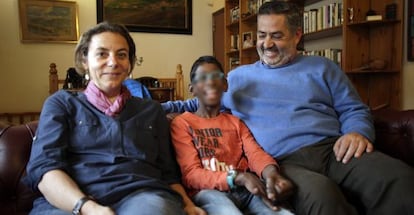Mahesh’s labyrinth
A 10-year-old with severe brain damage was denied rehabilitation via the public health system Social Security said it would not cover the child’s treatment because he was under 16

A judge has ruled that a 10-year-old boy with severe brain damage resulting from an accident has the right to free therapy from the public health system.
The February ruling upholds a claim by the boy's parents, Paloma and José Miguel, who found out that Social Security did not cover their child’s treatment because he was under 16. Adults with the same condition do get cover.
Young Mahesh fell down a ravine two years ago and sustained major neurological damage as a result of a blow to his head. He was in a coma for 25 days, and was discharged from Madrid’s Niño Jesús Hospital in March 2012, after spending six weeks there.
“He went from being a statistically normal child to needing a wheelchair and diapers; he did not recognize us and could barely speak,” explains his mother.
The doctors who treated Mahesh at Niño Jesús recommended intensive rehabilitation, which marked the beginning of a long ordeal for his parents.
José Miguel explains that most children who suffer the same type of brain injuries have been involved in road crashes, and therapy costs are covered by the insurance companies.
Most children who suffer the same type of brain injuries have been involved in road crashes
“But those who are in this state because of an accident like my son’s, or because of a tumor or meningitis, cannot access the rehabilitation that adults get,” he says.
Paloma and José Miguel have no complaints about the hospital, where the boy received 67 physiotherapy sessions and still gets routine checkups, said a spokesperson for the Madrid regional health department.
“But that is not enough; this pathology requires a lot more, as the Niño Jesús reports say,” adds Paloma.
When Mahesh was discharged, the hospital’s social worker gave his parents a list of six specialized therapy centers. Only one was public, the Centro Estatal de Atención al Daño Cerebral, but it did not accept patients under 16 or over 45 years old.
The other centers, which work in partnership with the Madrid health services (Sermas), also had an age requirement of 16 through 75. Nobody has been able to provide Paloma with a good explanation as to why children are left out of the system.
“At the time we were in shock over what had happened; all we could think of was that we needed to find the right center,” recalls Paloma. “So we turned to private healthcare.”
“At the time we were in shock, and just wanted to find the right center”
Mahesh ended up getting one free weekly physiotherapy session at the hospital and private sessions in speech therapy, occupational therapy and psychomotor activity at Hospital Beata María Ana. He continues to receive this treatment on the recommendation of doctors at Niño Jesús and the private hospital.
When they realized that adults were getting the kind of free treatment that children were being denied, Mahesh’s parents decided to sue.
“It is an injustice. Why? What about people who cannot afford this expense?” wonders Paloma.
The court has ruled in their favor, although it dismissed the claim that Sermas, the Madrid health services, should pay them 25,878 euros to cover the cost of the private treatment to date.
In the meantime, Mahesh is speaking again, “although he has trouble finding the words.” He also walks with some difficulty, and is back in school. But there is a long struggle ahead for him; nor will he ever go back to the way he used to be. “But it’s about making him as self-reliant as possible,” say his parents.
Sermas has already appealed the judge’s decision.
“That is how they have answered us, instead of accepting the ruling and telling us where to take our child,” notes José Miguel, adding that they will “keep fighting.”
More than physical and speech therapy
Neurorehabilitation is essential in treating traumatic and acquired brain injury, which causes cognitive, sensory and emotional damage, explains the Spanish Brain Injuy Federation (Fedace).
The public Centro Estatal de Atención al Daño Cerebral (Ceadac) only accepts patients between the ages of 16 and 45. This is because Ceadac is meant to help people who cannot access the labor market because of their condition, noted the center director in a letter to Paloma sent in 2013.
The Madrid regional health department says it offers rehabilitation to children with traumatic or acquired brain injury “as long as they are requested through the right channels.” But a spokesman for Fedace replied that there are no spots for them either at public centers or at those that partner with Sermas.
Tu suscripción se está usando en otro dispositivo
¿Quieres añadir otro usuario a tu suscripción?
Si continúas leyendo en este dispositivo, no se podrá leer en el otro.
FlechaTu suscripción se está usando en otro dispositivo y solo puedes acceder a EL PAÍS desde un dispositivo a la vez.
Si quieres compartir tu cuenta, cambia tu suscripción a la modalidad Premium, así podrás añadir otro usuario. Cada uno accederá con su propia cuenta de email, lo que os permitirá personalizar vuestra experiencia en EL PAÍS.
¿Tienes una suscripción de empresa? Accede aquí para contratar más cuentas.
En el caso de no saber quién está usando tu cuenta, te recomendamos cambiar tu contraseña aquí.
Si decides continuar compartiendo tu cuenta, este mensaje se mostrará en tu dispositivo y en el de la otra persona que está usando tu cuenta de forma indefinida, afectando a tu experiencia de lectura. Puedes consultar aquí los términos y condiciones de la suscripción digital.









































